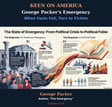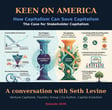
Episode 2481: Jonathan Rauch on The Resistance to Trump 2.0
Has Signalgate triggered a credible resistance movement to Trump 2.0? Brookings scholar and Atlantic columnist Jonathan Rauch isn’t particularly optimistic. He discusses the emerging resistance from law firms, media, and some religious groups, while expressing concern about Trump potential defiance of Supreme Court orders. Rauch observes that the opposition to Trump’s authoritarianism remains fragmented, but believes that eventually counter-organization will develop, though he remains uncertain whether it will happen quickly enough to be effective.
Five Key Takeaways from the Rauch Interview
* Patrimonial Governance: Trump's administration operates on what Rauch describes as a patrimonial model where loyalty to Trump is paramount, with officials trying to "work toward the Führer" by anticipating his desires rather than awaiting orders.
* Institutional Breakdown: Rauch believes the U.S. has moved from a three-branch to effectively a two-branch government, with Congress largely absent as a check on executive power.
* Fragmented Resistance: Opposition to Trump remains disorganized, with Rauch noting that resistance is forming but suffering from a collective action problem where institutions (law firms, universities, think tanks) are being picked off individually.
* Supreme Court Concerns: Rauch predicts Trump may openly defy a Supreme Court order in his second term, which would represent an unprecedented constitutional crisis.
* Religious Politics: Despite writing a book on Christian politics, Rauch sees no cracks in evangelical support for Trump, though he does believe some religious groups might eventually respond to extreme measures like deportations or humanitarian crises.
Keen On America is a reader-supported publication. To receive new posts and support my work, consider becoming a free or paid subscriber.
Jonathan Rauch is a senior fellow in the Brookings Institute’s Governance Studies program and the author of eight books and many articles on public policy, culture, and government. He is a contributing writer of The Atlantic and recipient of the 2005 National Magazine Award, the magazine industry’s equivalent of the Pulitzer Prize. His many Brookings publications include the 2021 book “The Constitution of Knowledge: A Defense of Truth”, as well as the 2015 ebook “Political Realism: How Hacks, Machines, Big Money, and Back-Room Deals Can Strengthen American Democracy.” Other books include “The Happiness Curve: Why Life Gets Better after 50” (2018) and “Gay Marriage: Why It Is Good for Gays, Good for Straights, and Good for America” (2004). He has also authored research on political parties, marijuana legalization, LGBT rights and religious liberty, and more.
Named as one of the "100 most connected men" by GQ magazine, Andrew Keen is amongst the world's best known broadcasters and commentators. In addition to presenting the daily KEEN ON show, he is the host of the long-running How To Fix Democracy interview series. He is also the author of four prescient books about digital technology: CULT OF THE AMATEUR, DIGITAL VERTIGO, THE INTERNET IS NOT THE ANSWER and HOW TO FIX THE FUTURE. Andrew lives in San Francisco, is married to Cassandra Knight, Google's VP of Litigation & Discovery, and has two grown children.
This is a public episode. If you'd like to discuss this with other subscribers or get access to bonus episodes, visit keenon.substack.com/subscribe



















